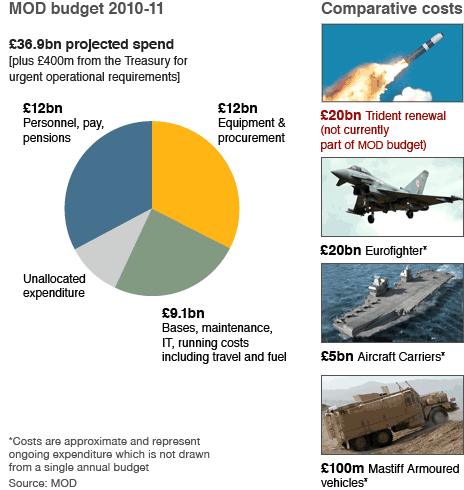Trident cash timetable could change - minister
- Published
David Cameron: "We believe in Britain's independent nuclear deterrent"
Britain remains committed to replacing its nuclear weapons but the timetable for financing the scheme could change as a result of a value for money review, Armed Forces Minister Nick Harvey has admitted.
The BBC understands the main spending decision could be delayed until after the 2015 general election.
Mr Harvey insisted the procurement process would not be held-up.
But Labour warned any delays could put Britain's continuous deterrent at risk.
'Value for money'
Mr Harvey, a Lib Dem, told MPs the government had decided in principle to renew Trident and the next stage of the decision-making process, the commissioning of more technical designs and plans, would take place by the end of this year or early 2011.
"There is no suggestion that I am aware of either delaying any decision or indeed of delaying the procurement," the Lib Dem MP said.
But he added: "The value for money study which is taking place at the moment - and which has yet to make a decision - may well look at the expenditure profile - the order, if you like, in which the programme takes different parts of the work."
Mr Harvey said the final decision to spend billions of pounds on new submarines - called the "main gate" decision - is currently scheduled for 2014 or possibly early 2015.
But he added: "If it did shift a few months at that stage, it is not going to make any difference in terms of finance or in terms of the impact on the industrial base."
BBC deputy political editor James Landale said this was the first time a minister has entertained in public the possibility of delaying the "main gate" decision to renew Trident.
Deterrent 'risk'
The Lib Dems are against a like-for-like replacement for Trident, but secured an agreement with their Conservative coalition partners, who are strongly in favour of one, to carry out a value for money study.
This is aimed at exploring cheaper options to the estimated £20bn scheme currently in development.
Speaking at an EU summit in Brussels, Prime Minister David Cameron said he believed in "maintaining and updating" Trident but it was right the government got value for money in doing so.
He said he expected daily speculation about possible cuts ahead of next month's spending review but the government was determined to "deliver things we care about" - including Trident.
But Conservative backbenchers reacted angrily to suggestions that the Trident decision could be delayed.
Former shadow defence minister Julian Lewis said the commitment to push ahead with Trident had been one of the elements which persuaded Tory MPs to agree to the coalition with the Lib Dems.
He said it would be a "breathtaking betrayal" to have a rethink of that deal, adding that he would be "amazed" if Defence Secretary Liam Fox remained in his job if it happened.
Another Tory MP Bernard Jenkin, another former defence spokesman, warned on BBC Radio 4's Today that it would be "extremely divisive" if the coalition agreement on Trident were abandoned.
Shadow defence secretary Bob Ainsworth, for Labour, said delaying a decision could risk Britain's continuous "sea deterrence" and cost industry billions.
Cold War era
"The government can't just simply put off such difficult decisions because they can't make up their mind.
"Their internal squabbles and the divided nature of the coalition on this issue cannot be allowed to affect choices which will have such a huge impact on our future capabilities."
But former Liberal Democrat leader Sir Menzies Campbell told the BBC it made "no sense" to be committed to a like-for-like replacement of a nuclear weapons system designed for the Cold War era and it made sense to look at alternatives.
Some Conservative MPs were stuck in a Cold War mentality and the changed nature of threats facing Britain meant a "full-scale" review of nuclear policy was needed, he added.
Deputy Prime Minister Nick Clegg said Conservative and Lib Dem ministers were keen to reach an agreement on Trident "that makes sense and reflects both our thinking" but admitted that was something "we clearly haven't done yet".
Air Chief Marshal Sir Jock Stirrup: "If you're going to have (a nuclear deterrent) you have to have a credible one"
Britain's nuclear weapons system is made up of four submarines, based at the Faslane naval base on the Clyde, which can deploy Trident ballistic missiles carrying nuclear warheads.
At least one submarine is always at sea so a continuous deterrent can be maintained.
The outgoing head of the armed forces warned that the government might as well scrap Britain's nuclear weapons system if the decision is taken to downgrade it.
Air Chief Marshal Sir Jock Stirrup told a committee of MPs: "I would be worried about any proposition that was untenable in the context of maintaining the minimum credible nuclear deterrent, which, to me, is continuous at-sea deterrence by a submarine."

David Cameron: "We believe in Britain's independent nuclear deterrent"
- Published15 September 2010
- Published15 September 2010
- Published15 September 2010
- Published14 September 2010
- Published21 June 2010
- Published13 June 2010